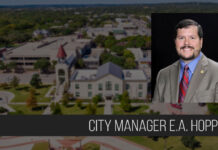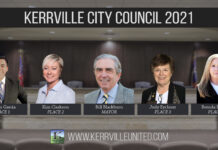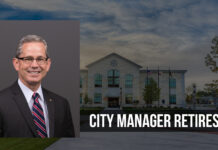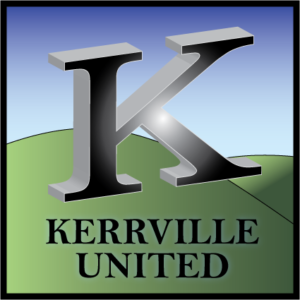We will be live-blogging the Kerrville Area Chamber of Commerce candidate forum at Schreiner University beginning at 6:00 PM.
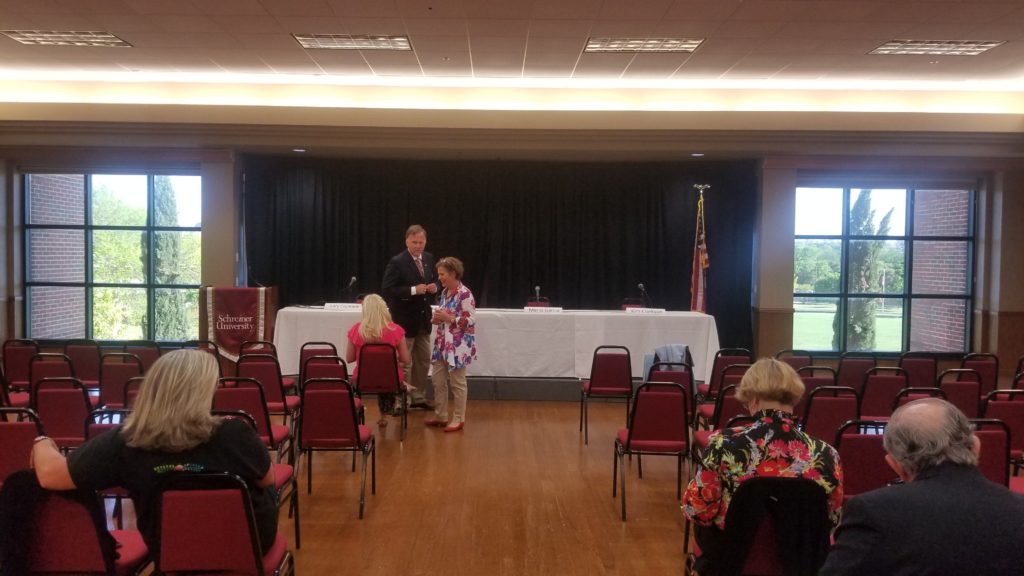
5:45 PM – Candidates and community members are gathering and visiting ahead of the forum, which is scheduled to begin at 6:00 PM. Chairs are set for approximately 200 spectators on the second floor of the student activity center. Behind the candidates’ stage, the easterly view looks over the front entrance toward Highway 27.
5:55 PM – The five-minute warning has been announced and all four candidates are in their seats on the stage. From left to right, there’s the moderator’s podium, then Gary Cochrane, George Baroody, Mario Garcia, and Kim Clarkson. Tonight’s moderator is Walt Koenig, executive director of the Kerrville Area Chamber of Commerce. The crowd is taking their seats and it’s a near-capacity crowd.
6:00 PM – Tim Rye, head of the chamber’s governmental affairs committee, welcomes the audience and the candidates. Walt Koenig takes to the podium and encourages the candidates, thanks the crowd for participating in democracy. “We can’t have a democracy if we don’t have a choice.”
Rules/Format: Each candidate will give a three minute opening statement. There is a timekeeper in the front row. Series of questions to follow — some from Walt and some from the audience. The audience is invited to write questions on note cards and hand them in during the event. Each question must be answered in one minute. At the end, each candidate will give a two-minute closing statement. The order of the seating has been assigned randomly, and the order of the statements is also random.
Opening Statements
Kim Clarkson goes first. She goes to the podium for her opening statement… She was born and raised in Kerrville, came back to Kerrville after college, and taught at Starkey Elementary. Seven years later she joined her family’s business, and decided to go to work for various nonprofit organizations in Kerrville including CWJC, Habitat, Blue Santa, etc. She was asked to be on various boards such as KPSF, Chamber, Executive Women’s Club, United Way, and more. She has honed her leadership skills at these organizations and her family business. She was involved in local government via the Kerrville 2050 Plan, governmental affairs committee chair at Chamber. She has developed the necessary skills to do this job, and her heart is with this community. She has proved this with her actions, not just her words.
Gary Cochrane goes second… After thanking the chamber and the audience, he starts by saying he’s not a public speaker or a politician. He loves the community and has come to realize that we have some issues on city council that need resolution. It’s his turn to step up and make a change. We all want good roads, water, safety, etc., and have different means of getting there. This election isn’t as much about issues as it is about the people getting elected. Certain traits are important: integrity, moral standards, vision, communication, listening, trust. Trust has been violated on current council. Issues are important, but this election is about the people.
George Baroody is third. He stands at podium… He’s 51 and has lived in Kerrville 17 years. He’s an umpire. He defines the job of council as an advocate for the people. Convey the wishes of the people to the staff and the public. The vision that each has involves where they’re coming from and where they’re going. He isn’t trying to take the city somewhere. He’s continuing the traditions of Kerrville. He isn’t satisfied with the current trends going on in city government: spending is going up, debt is up, household values are up 25%, all while population is going up, and personal income is going up only 6%. The gap between income and expense is a problem. Must come to table with ideas to resolve the problem. Need accountability with our economic development. Shouldn’t be subsidizing businesses. Should invest in workers, not just businesses.
Mario Garcia goes fourth from the podium… Everything everyone just said is true. He grew up in Kerrville and he’s running to make his mom and kids proud. He’s also doing it for all of the seniors and elders in the community that raised him. He has old and traditional values. Who are these individuals running for council? He’s a Navy vet, carried top secret clearance working on nuclear weapons. Was a stay-at-home dad for a time. Started a business in Austin and brought it back to Kerrville. Wanted a sense of community for his family and children. He has been running Kerr PC for 14 years in Kerrville. He’s been hustling, working, volunteering as a coach, CMJC, and elsewhere. He comes from traditional values, has a different belief about spending (not a club to damage ourselves). He’s proud of where he comes from.
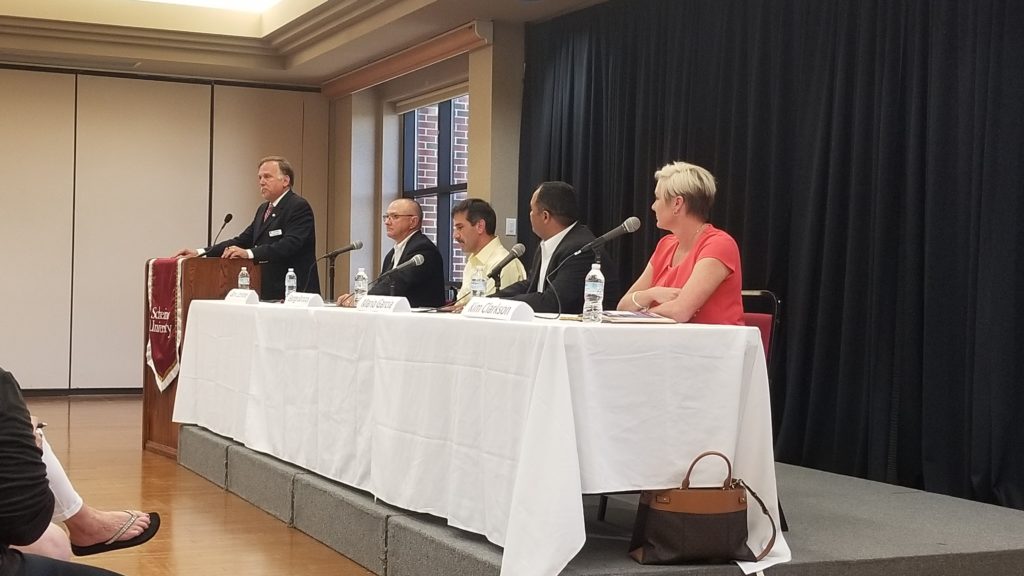
Question 1: What is your vision for the future of Kerrville?
Cochrane: His vision is not as important as the citizens’ vision. Citizens created 2050 plan, and council should honor that. Wants Kerrville to continue to grow responsibly. Can’t stand in the way of progress. He’s a big advocate for quality of life programs. His vision is to continue both of those trends.
Baroody: Keep looking forward with an eye on the past. He’d like to see Kerrville keep its identity. Growth is coming, and it must be sustainable. Need opportunities for all; not just a few. That’s his biggest factor. The people need a voice. No Kerrvillian left behind. Everyone counts equally, and policies should be equitable.
Garcia: His vision wants to be “shared.” We don’t have enough community input; need more. He has a lot of respect for past. One foot in the past, one in the future. Growth is coming. Everyone is talking about sustainable growth, but we shouldn’t inject it. It should be natural growth. Let’s have more community input and put citizens first.
Clarkson: Reads from mission statement of Kerrville 2050. “Kerrville will be a vibrant and inclusive community…” This is our statement, the vision from Kerrville 2050. Every decision should be based on a look to the vision and a look to the future.
Question 2: If elected, what would your top three priorities be?
Baroody: Economic well-being of the individuals of Kerrville; Housing; Growth status of city regarding infrastructure and potential businesses. As to economic status, it needs to be said that economic status of individuals has been neglected, and should be the focus. We’ve invested in the new instead of the existing. Once we do that, everything else becomes easier if you’ve invested in the people. “No Kerrvillian left behind.”
Garcia: Radical openness… we need to share ideas. Radical transparency means that everything needs to be open. Last is citizens. Need more citizen participation. He’s going to have monthly meetings for citizens.
Clarkson: First is civility. We are not able to effectively communicate if we can’t listen. Without listening, we can’t grow. Second, basic infrastructure and housing needs. Third, grow and diversity the economy. Bring in jobs with good wages so that all can enjoy quality of life. Lastly, quality of life. What made you want to move here? We enjoy the river trail and other thing and our future depends on quality of life so that it’s a place people want to come.
Cochrane: Our council is broken and it needs to be fixed. Second, economic growth. We have to come at it from all angles for sustainable and safe growth. If not growing, we’re dying. Lastly, housing. He doesn’t have the solution today, but we have to lay the groundwork for a solution. Baroody hasn’t put forth any ideas in his two years, but Cochrane has ideas, and he’s ready to get to work.
Question 3: What is the city’s role in terms of helping the current housing deficit?
Garcia: “Strong towns” idea. We’ve been increasing our liabilities. We need to focus on our existing beautiful neighborhoods. Build on vacant lots. Build up parks. Some things we can do downtown, too. Needs to be sustainable. We have lots of real estate inside city to continue growing. “We cannot keep going into liabilities.”
Clarkson: The city is not a builder or a developer. What can the city do? Provide a space that is attractive to builders and developers, such as city property on Loop 534. City can build infrastructure and send requests to developers to bring ideas and solutions. 2050 plan has told us that we need to diversify housing. Must play our part to encourage the kind of housing that community needs.
Cochrane: There is no easy solution. Must look at increasing density through some potential zoning changes. The city should extend services such as water and sewer to encourage development. Must begin planning for water/sewer. City isn’t in development business and city shouldn’t incentive developers. “If you build it, they will come.” Builders want to make money, so if it’s attractive to do so, they’ll come and build.
Baroody: The city isn’t a builder or developer, but we can incentivize. First, need incomes to the point where they can afford housing, and needs jobs that pay well. If Cochrane was paying attention, he’d note that projects have been proposed, but they’ve stalled, and Baroody doesn’t know why. We’ve been trying, but it hasn’t been followed through on.
Question 4: If elected, how do you see the dynamics of council working? And community engagement?
Clarkson: Citizen engagement is critical to success of city. We do not need to dictate the decisions for the future of our city. Those decisions come from citizens. We can continue to push out the information, ask questions. If we can’t communicate effectively, we can’t govern. Need a diversity of opinion, and need to be able to move forward after a decision has been made.
Cochrane: The council is a team, but doesn’t mean they always agree. Needs respect. You discuss, communicate, decide, and move forward. If I don’t agree and I lose a vote, that’s ok, we’ll move forward. Not going to keep going back to subjects from two years ago. For community engagement, he wants to reach out and hear what people have to say. The door is open to the citizens.
Baroody: The ability to have dissenting discourse and keep that civil. Right now, dissenting views are shut down. That’s wrong. You have to have the discussion. If we can’t find a way to disagree, then that’s the fault of the entire council. Just watch the last city council meeting and see how I just accepted a lot of heated comments.
Garcia: When citizens are more involved, you get the personalities out. I’m not everybody’s cup of tea. I enjoy dissenting opinions, because it’s necessary. Put it on the ballot. Put big things on ballot such as big projects, long-term debts. This is your city.
Question 5: What is the city’s role in economic development?
Cochrane: The city’s job is to provide framework and environment that is attractive to businesses. Infrastructure, quality of life, attractive place to live. When he was on EIC, companies asked what their employees would do after work. You don’t want to incentivize anyone without “clawbacks.”
Baroody: City should be in the business of setting up framework to be equal and fair. Every business has advance knowledge of risks, etc., not just “knowing somebody.” Need standards and benchmarks from our economic development strategies. We need to know what to expect from council and city. Shouldn’t use public funds in a speculative way.
Garcia: The city has to be involved, but he’s not big on incentives. He won’t say “never,” but wants checks and balances. Need to analyze and show a return on investment. Everywhere else, we need to show a return, but not in government. Must be very careful when we invest in economic development.
Clarkson: The 2050 plan says that economic development is important. We have a starting place with the comprehensive plan. Must provide infrastructure that encourages development. Need quality of life projects to attract businesses. The EIC funds are designated for these things, and we must use that money for infrastructure in support of economic development, and for quality of life projects. We must continue to use that funding source.
Question 6: How do you see your role in fulfilling the objectives of the 2050 plan?
Baroody: I want to change the title of the plan to “Our voice, our city.” Council must cheerlead for the plan but constantly review it. What needs to be tweaked? It is an evolving document. Just because it’s in the plan, doesn’t mean we have to do it. Always paying attention to what’s in the plan, but looking to better it.
Garcia: It’s a living document, not permanent. Need to have at least five years to review it before implementing it. Is it applicable to the direction we’re going? Is it future proof? We need to make sure that the citizens are involved. Need to review the document as we go. It is necessary for us to have it, to have a vision, but it needs to be reviewed.
Clarkson: We have a council-manager form of government. We hear the goals from the community, set the priority, and implement that vision. We can revise it if we hear something different, but we look at the plan and see what was identified as priorities, and we set the strategies to make them happen.
Cochrane: The citizens put this plan together. It belongs to the citizens, not to the council. It’s a roadmap, a goal, and that’s what the comprehensive plan is. We can reach the goals in many different ways, evaluate the plan on a regular basis, and receive citizen input along the way.
Question 7: Actions to develop tourist industry?
Garcia: Tourism has always been here, ie summer camps. We have never had a problem with tourism. It’s already here. We have a sufficient amount of tourists. We don’t want to be like anybody else. We can’t forget who we are. We have everything we need, we should enjoy the tourists, and we need to spend our money to take care of the residents, not the tourists.
Clarkson: We should look at building a convention center. We can attract more professional groups that come here, spend money, leave behind their tax dollars, and use those monies locally to reinvest into local community. Bring people in, then send them home, and it’s a win-win.
Cochrane: Kerrville is very attractive to tourists. We have a sense of community and environment. We need to continue to develop the river trail system as a tourist attraction and also the urban trail. We need to look at supporting downtown revitalization. Vibrant downtown is a tourist draw.
Baroody: Tourism is a secondary topic. We just keep making Kerrville the greatest city we can, and tourists will come. The river is always going to be there and we should enhance the use of it. I support downtown development, but not every mechanism used to support that. The role of the city is not about incentivizing tourism, but to welcome it.
Question 8: Give your evaluation of the overall financial status of our city.
Clarkson: Looking at the budget was the first thing I did as a candidate. I asked lots of questions. What I conclude is that we have had leaders with vision to create self-imposed debt limits to keep us from getting into a bad situation. We have a AA bond rating, clean audit, debt limits… We can sustain ourselves because we have ways prove to ourselves that we’re on track.
Cochrane: I have a degree in finance and have been in business, but I’m not a financial expert. I surround myself with experts, and I trust and verify with them. We have independent analysts that tell us that we’re in good shape. We have a professional city staff. Yes, we’re in good financial shape. I find it interesting that some of the other candidates don’t want to compare our city to certain other cities, but they will when it comes to debt.
Baroody: The financial situation is strong. We have a AA rating. We’re not going to default on debt. The taxpayier position is more important. Our median household income went down while our debt went up. We need to focus on that. We need to address any future debt this way.
Garcia: We’ve been increasing debt. Must look at the graph from a distance. Kim brought up the convention center. The comptroller has a report that convention centers are saturated and small towns shouldn’t do convention centers because it’s a waste. This is the difference of ideas. That’s one idea, and we’ll go into debt, and it will be a vacant building with no one using it.
Question 9: What priorities would you put on spending discretionary money to advance objectives of the city?
Cochrane: The city has to spend money. We have to provide the services to the community. I’m fiscally conservative. Can we use debt for capital projects? Yes. We can’t improve our infrastructure without using debt.
Baroody: Prioritizing spending is very important and we don’t spend enough time on it. Since 2011 our priorities are off-track. We focused on “wants” instead of infrastructure. We haven’t addressed infrastructure. We’ve borrowed money to spend on attractions, and we can’t borrow for other things. We should sit down and prioritize our entire budget.
Garcia: Spending happens all the time, but I’m not a proponent of going into debt. We have spent on nice things but don’t have the money to spend on other things. All debt spending is affecting future spending. We have to be very careful how we use debt. Let’s focus on primary services. Take care of infrastructure first.
Clarkson: I never said that we need to spend money on a convention center. I said that we can grow the tourism industry that way. I am conservative. I have one mortgage which will be paid off in five years, but I couldn’t have bought a home without debt. We cannot do big projects without taking on debt. We have to see the big picture.
Question 10: How do we make Kerrville attractive to all age groups?
Baroody: Until we have good jobs, we can’t retain our young folks. If we can’t get jobs with those salaries that can support a family, they won’t stay. The solution is complicated, but jobs will retain the young people, and we should focus on that.
Garcia: The Kerrville Youth Advisory Council could benefit from mentors. We should embrace them. Very few people are in their meetings. We need to educate them. When they get older, we need a workforce that’s inviting to them. I left and many others have left, too. I’d love for them to stay here.
Clarkson: We start by listening. We have the Kerrville Youth Advisory Committee. We need listening opportunities. In the future, what makes them come back? They need a job, an affordable home, and a reason to want to come back here.
Cochrane: When I was on EIC, we brought Fox Tank to Kerrville, and they provided education for welders, and that’s been successful. We can do more things like that. They must be able to make a living wage. My son graduated from Tivy and was fortunate to find a job, but most struggle to come back here. So it comes to jobs. People want to be here, but they have to make a living.
Closing Statements
The candidates receive another round of applause. The closing statements are in reverse order from the opening statements. Two minutes each.
Garcia: Tonight was a comparison/contrast. I won on Wheel of Fortune. Before I received the money, I decided to use it wisely. The difference between us is that I’m someone who wants to spend your money to get a return. It’s easy to spend money and have no expectations. I got $40,000 from Wheel of Fortune, and I’ve turned it into more than that. I’m not a big spender. This is your money, and I need all of your input. Debt was a tool for me.
Baroody: This open discourse is rare but valuable. We’re all qualified in different ways. My qualifications are a willingness and desire to not just serve a portion, but to serve all of the community and provide the information that isn’t being provided anywhere else. All can enjoy and use that information. The issue that’s important to me is household incomes. The median household income and the number of students on subsidized meals shows that our economy isn’t as strong as we’d like to believe. We have income inequality. We have to address that. The workers that are needed here can’t afford to live here.
Cochrane: I’m up here applying for a job. The job is Place 1 City Council. You have two resumes. Hopefully mine looks pretty good. When you hire somebody, you look at experience, similar service, leadership, work with others, vision, communication, and more. It is about the messenger and the message. We need to treat others with respect. My record speaks to financial responsibility. I have the qualifications and I hope you’ll consider voting for me.
Clarkson: I want to be part of the journey. This is a marathon, not a sprint. You have to see the future and see a solution and get there step by step. That’s the challenge that city council has to look at — long-range perspective. I have shown you my heart through my service. I’ve shown you my leadership through my service in organizations. I want my kids and grandkids to come back to a vibrant community. I want to work with you to accomplish goals to lead us into the future.
Ending
7:28 PM – Koenig encourages everyone to turn out to vote and increase the rate of turnout in this election. Call neighbors and friends to turn out the voters. Thanks to Schreiner University for providing this venue free of charge. Thanks to Chamber Board. Goodbyes.
The candidates depart the stage with applause.

